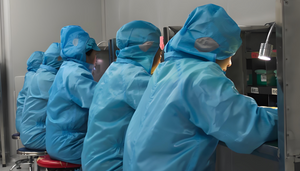
Fully inspected in China
Do you need full inspection or AQL sampling?
Have you ever had a situation where you sampled your shipments and found defective products? If so, you need to inspect them all .
Choosing the full inspection service means you don’t have to worry about product quality . Poor quality products can result in refunds, additional taxes, or even expensive recalls or legal action .
Currently, there are two main inspection methods:
- Full Inspection
- AQL Sampling Inspection (AQL Sampling Inspection)
This article will focus on the advantages of a full inspection. If you are new to the inspection process and are unsure which option you should choose, keep reading!
What is 100% inspection?
As the name implies, 100% inspection means checking the entire batch of goods , not just a random sample.
So, when do you need a full inspection? Read on to learn more.
Purpose of conducting a full inspection
The purpose of the full inspection service (100% defect screening service) is to screen out as many known defective products as possible, such as:
- Appearance issues
- Functional defects
- Workmanship defects
- Security risks
- Dimensional error
Certain special inspections may not be fully performed during the designated inspection working hours.
This service ensures that each finished product meets the quality standards specified by the customer. Typically, the quality requirements are provided by the customer and the list is relatively short so that the inspection process can be more efficient and focused.
In the full inspection service (screening inspection), an engineer and inspectors will conduct 100% inspection work on site to ensure that all products meet the customer's quality requirements and are in good condition.
When is a full inspection required?
In most cases, 100% quality inspection is not necessary. However, if counterfeit brand products are mixed into your shipment, which could lead to legal action, then full inspection is particularly important.
The following situations usually require a full inspection:
1. Transporting high-end or luxury goods
If your product falls into the high-end or luxury category, for example:
- Precious Metals
- Expensive jewelry
- Precious metal watches
These products are extremely risky to transport and need to meet a series of strict requirements. If they are damaged, counterfeit or fake, your losses will be very serious. Therefore, it is crucial to fully inspect luxury goods.
2. The supplier did not implement effective quality control
If the supplier does not implement strict quality control measures during the production process, the defective rate of the product will be high. This usually happens after the first inspection fails and the supplier still does not take any corrective measures.
In order to avoid customer complaints, full inspection is necessary, especially for:
- High value products
- Products that may endanger consumer safety (such as electronic products, medical devices, etc.)
If quality issues are found, inspectors can conduct targeted key inspections, which is more efficient and time-saving than looking for all problems one by one.
3. Suppliers may replace good quality products with defective batches
During the manufacturing and distribution process, companies may encounter batches that do not meet quality standards:
- Sometimes only one or two products are defective
- But sometimes the entire batch is affected
If there are quality problems with two or more consecutive batches of products, it is recommended that you conduct a full inspection. This will ensure:
- Defective products will not enter the market
- If the product fails the inspection, the manufacturer shall bear the corresponding costs
- Avoid damaging brand reputation by selling defective products
In addition, some suppliers may secretly replace your qualified products to cover up their production defects. In this case, full inspection can help you avoid quality risks.
4. The goods need to be processed in different factories
In some cases, your products may come from different factories and need to be reprocessed or repackaged before final shipment. In this case, full inspection is the best way to ensure the quality of the final product.
Typically, 100% quality inspection is suitable for products with strict safety standards and zero tolerance for defects. However, for general consumer products, this type of inspection is optional.
Should all inspections be carried out at the supplier's factory?
As an importer, you may ask:
“If I hire an inspector, should I conduct all inspections at the supplier’s factory?”
Whether to conduct full inspection at the supplier's factory depends on the following circumstances:
Case 1: Low Quantity Products
If the number of products is small, it is ideal to inspect all of them at the supplier's factory because it takes less time to inspect each piece and the inspector's hourly inspection cost is lower.
Case 2: Products with simple manufacturing process
If the manufacturing process of the product is relatively simple, fewer quality inspectors are needed and the inspection tools are not complicated. In this case, it is cheaper and feasible to conduct full inspection at the supplier's factory.
Case 3: Products that can be quickly inspected by the naked eye
For example:
- Luxury bags
- clothing
If the quality check of the product can be done quickly by the naked eye, then it is feasible to conduct a full inspection at the supplier's factory.
Case 4: Products with long manufacturing cycles
If the product takes 5 days or more to produce, the cost of hiring an inspector can increase significantly. In this case:
- High cost of full inspection at supplier factory
- Not very realistic
- May affect the overall delivery cycle
Solution
For the above situation, there is a more effective method:
- Send the product to a third-party inspection agency or agency for inspection
- Inspectors check products piece by piece
- If qualified, repack immediately
- Saves time and money than sending inspectors to the factory for multi-day inspections
Pre-shipment inspection is the key to ensure customer satisfaction. Whether it is random sampling inspection or full inspection, it is a reasonable way to ensure product quality.
Full inspection can help businesses avoid penalties for selling defective products and reduce concerns about product quality. In addition, ensuring that your products are of good quality can help you get better customer reviews, which can increase sales.
Share this product

Fully inspected in China
Have you ever found that even after sampling your shipments, you still found defective products? If so, you need to conduct a full inspection. Choosing a full inspection service means you don't have to worry about product quality. Poor quality products can result in refunds, additional taxes, and even expensive recalls or legal action.

